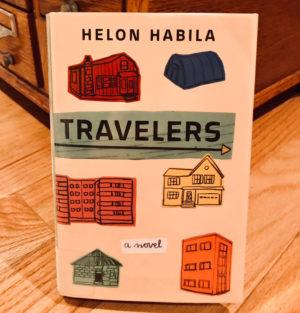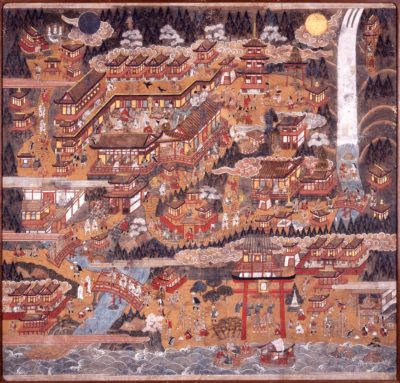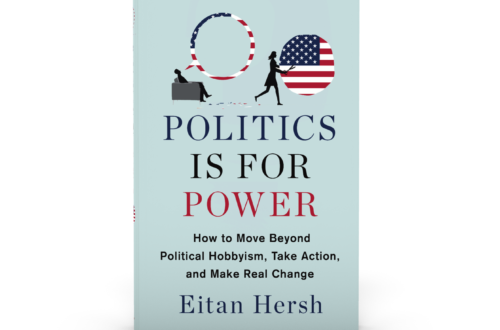
“Travelers by Helon Habila” Reviewed by LaVonne Roberts
What is it like to be a refugee? Around the world, 70.8 million people have been forcibly displaced. It’s hard to fathom the terrible extent of the refugee crisis, but Habila captures the humanity of his characters in a way that newspapers can’t. Travelers comes at a time when Americans are being forced to reckon with what our country is becoming, what values we truly hold dear. Habila’s stories parallel anti-immigrant narratives being espoused in the U.S. and globally today.
Helon Habila started working on Travelers in 2013, when in Berlin on a one-year fellowship. During that time, a German newspaper approached him to write something about a recent tragedy —a boat carrying over 300 migrants from Libya had sunk in the Mediterranean off the coast of Lampedusa, killing all on board, mostly women and children.
The narrator is an unnamed Nigerian scholar. The novel begins when he accompanies his American wife to Berlin, where she’s been awarded a prestigious arts fellowship for painting portraits of migrants. He voices his reservations: “I knew every departure is a death, every return a rebirth. Most changes happen unplanned, and they always leave a scar.”
From Germany to Switzerland to Italy to the UK, Habila’s unsentimental exploration of the refugee and migrant experience through the lens of a Nigerian-born scholar explores the concept of home in the context of those who cannot return to theirs. It’s an urgent, beautiful collection that proves that fiction can be more than mere storytelling — it bears witness to the hopes, dreams, and aspirations of the refugees that the world has forgotten about. Memories, like those of a long-suffering Somali in a grim Bulgarian camp, haunt the novel’s characters who have endured unimaginable trauma. Their baggage is the weight of their stories seeping human carnage.
Travelers depicts almost every type of immigrant imaginable: a transgender film student from Malawi seeking the freedom of authenticity, a Libyan doctor who lost his wife and child in the waters of the Mediterranean, and now works as a bouncer who shows up every Sunday at the family’s pre-arranged rendezvous at Checkpoint Charlie in hopes of reuniting with his wife, who may or may not have drowned on a traffickers’ boat. A Somalian shopkeeper trying to save his 10-year-old daughter from forced marriage to an al-Shabaab commander’s militant son. A young woman who visits her husband’s Swiss ex-wife who stood trial for his murder. An amnesiac woman who lost her fleeing family and is schooled to believe she is someone else — a soon-to-be-deported young man on a hunger strike.
Perhaps the most poignant story is that of the narrator, who slips into a nightmare of lost bearings. When he accidentally disembarks a train with a Somalian migrant’s bag rather than his, he realizes he’s lost more than his passport, he’s lost his identity. As the scholar’s intellectual privilege dissolves and he joins the plights of the transients he has encountered when he is detained. Wasting away in a refugee camp, the scholar’s account speaks to a universal dilemma of identity, which begs us to ask who we are without a document claiming our origin. Habila’s narrator must learn that ‘a black person’s relationship with Europe would always need qualification…”He or she couldn’t just be European—there always had to be an origin explanation.”
Travelers displaced characters wrestle with finding footing where they feel no connection. They all crave the stories “traded as a currency among homeless, rootless people” because “if they keep their memories alive then nothing has to die.” But Habila never asks the reader to pity them; only to see them as human beings. And because of his powerful writing, it is impossible not to love them. Every story succeeds on its own terms, however, it’s in the interweaving of narratives that deftly illustrates the complexity of the immigrant, refugee, and asylum seeker experience, but it’s so much more. Travelers is as a character-driven series of love stories, but not in the traditional sense. It is about what people do to save their loved ones from suffering–sometimes this only leads to more suffering, but the point is that they try.
There’s a beautiful chaos to all Habila’s interlinked narratives that takes us to the heart of the matter: how we make peace with the entanglements of the past and present. But the real question Travelers asks is: what it home? Like a master chemist, Habila’s titration of themes teaches us that when we are lost our internal compass isn’t attached to geography, but to our hearts. Slowly, we come to learn that when a home can neither be returned to or fully claimed, home is love, even in the absence of roots. Travelers will make you feel grateful. Moreover, it will reinforce your belief in the connection to strangers, who are not strangers. They are you and me. They are everyone.
*
Helon Habila is the author of the novels, Waiting for an Angel, Measuring Time, Oil on Water, and Travelers, and a nonfiction book, The Chibok Girls, an account of the more than 250 girls from Chibock Secondary School in Nigeria who were kidnapped by the terrorist group Boko Haram. His writing has won numerous awards including the Caine Prize, the Commonwealth Short Story Prize, and the Windham-Campbell Prize. He is professor of creative writing at George Mason University and lives in Virginia with his wife and three children.
*
LAVONNE ROBERTS is the author of award-winning short stories, personal essays, and poetry. Her writing has appeared in Litro Magazine, The Rio Review, The Blue Mountain Review, The Dead Mule School of Southern Literature, Waco Arts Fest Anthology of poetry, and When Women Waken anthology, among other publications. She currently resides in New York City, where she is completing an MFA at The New School and a memoir called HOME. She is the founder of WRITE ON!, which partners with provides literature and free ongoing community based creative writing workshops for marginalized populations like female victims of violence and adults who are experiencing homelessness.
© LIT Magazine 2019




